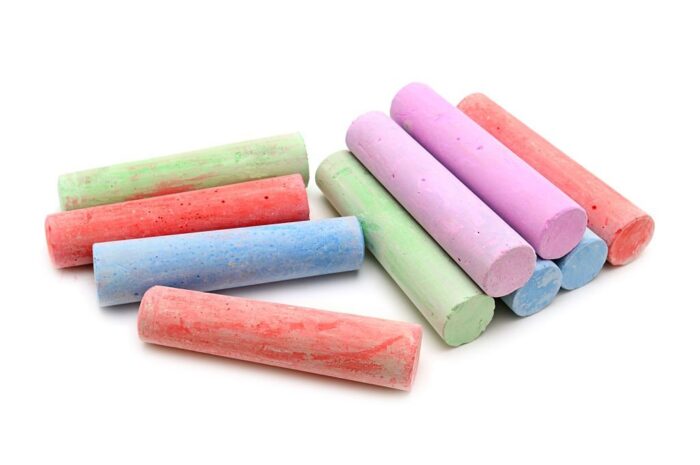Jeyam Cottage Industry based in Coimbatore, India is a manufacturer of manual and automatic dustless chalk making machines . The company specializes in designing and producing various types of chalk making machines, including manual and automatic models, which can produce both traditional and dustless chalk.
In addition to manufacturing chalk making machines, Jeyam Cottage Industry also provides training and technical support to customers who purchase their machines. This includes guidance on how to use the machines effectively, as well as troubleshooting and repair services if needed.
Dustless Blackboard Chalk
Dustless chalk is a type of chalk that is designed to produce minimal dust when used. This is achieved by using a different formulation compared to traditional chalk.
Typically, dustless chalk is made from a mixture of calcium sulfate and calcium carbonate, which are both natural minerals. This combination produces a chalk that is denser and harder than traditional chalk, which helps to reduce the amount of dust that is created when writing on a chalkboard.
Dustless chalk is commonly used in schools, colleges, and other educational settings, where it is important to minimize the amount of dust in the air. It is also popular with artists who use chalk for drawing, as it produces less dust and allows for more precise lines and shading.
It is important to note that while dustless chalk does produce less dust than traditional chalk, it still creates some dust when used. As such, it is recommended to use dustless chalk in a well-ventilated area and to take appropriate precautions to protect against inhalation of chalk dust.
Additionally, dustless chalk is available in a variety of colors, including white, yellow, green, blue, and red. Some brands also offer neon or pastel colors. The color pigments used in dustless chalk are similar to those used in traditional chalk, but they may be slightly different due to the different formulation.
One of the benefits of dustless chalk is that it tends to last longer than traditional chalk. Because it is harder and denser, it does not wear down as quickly, which means that it needs to be replaced less frequently.
In terms of cost, dustless chalk is generally more expensive than traditional chalk, but the price difference is typically not significant. It is also worth noting that some brands of dustless chalk may be more prone to breaking than others, so it is important to choose a brand that is known for its durability.
Another benefit of using dustless chalk is that it can be easier to clean up. Because it produces less dust, it doesn’t leave behind as much residue on the chalkboard or on surfaces that it may have accidentally come into contact with. This can make it easier to maintain a clean and tidy workspace or classroom.
Furthermore, dustless chalk is often preferred by individuals who have allergies or sensitivities to dust or who suffer from asthma. Traditional chalk can produce a significant amount of dust, which can exacerbate these conditions. Dustless chalk can help reduce the amount of dust in the air and provide a more comfortable environment for those with respiratory issues.
It is worth noting that, while dustless chalk is a great option for many people, it may not be suitable for all situations. For example, some individuals may prefer the texture and feel of traditional chalk, or may need a softer chalk for certain types of drawing or writing.
In conclusion, dustless chalk is a useful alternative to traditional chalk for those who want to reduce the amount of dust produced while writing or drawing on a chalkboard. It is available in a range of colors, tends to last longer, and can be easier to clean up. While it may be slightly more expensive than traditional chalk, its benefits in terms of reduced dust and increased durability make it a worthwhile investment for many individuals and educational institutions.
Dustless Chalk Making Machines
A chalk making machine is a device used to produce chalk sticks in large quantities. The machine typically consists of a mixer, a molding machine, and a drying chamber. The process of making chalk with a chalk making machine involves the following steps:
- Mixing: The ingredients for the chalk mixture are combined in the mixer. The ingredients may include calcium carbonate, gypsum, pigments, water, and other additives.
- Molding: The mixed ingredients are poured into the molding machine, which shapes the mixture into the desired size and shape of the chalk sticks. The molding machine may use a variety of molds to produce different sizes and shapes of chalk.
- Drying: The molded chalk sticks are then placed in a drying chamber to remove excess moisture. The drying process may take several hours, depending on the size and shape of the chalk sticks and the temperature and humidity in the drying chamber.
- Packaging: Once the chalk sticks are fully dried, they are packaged and ready for use.
Chalk making machines are commonly used in schools, colleges, and other educational institutions to produce large quantities of chalk sticks. They are also used by small-scale manufacturers who produce chalk for sale to consumers.
Chalk making machines come in a variety of sizes and capacities, from small tabletop machines to large industrial-scale machines. They can be manually operated or automated, depending on the needs of the user. Some machines also have the ability to produce colored or scented chalk sticks.
Overall, chalk making machines are a useful tool for producing large quantities of chalk sticks efficiently and consistently. They are widely used in the education industry and by small-scale manufacturers.
The cost of a chalk making machine capable of making 500 pieces is INR 75,000, while a machine capable of making 1000 pieces costs INR 125,000.
Jeyam Cottage Industry
Coimbatore
+91 9659 782821
https://www.facebook.com/people/Jeyam-cottage-industry/100054272346284/
You may also be interested in this manufacturer of Testliner.
